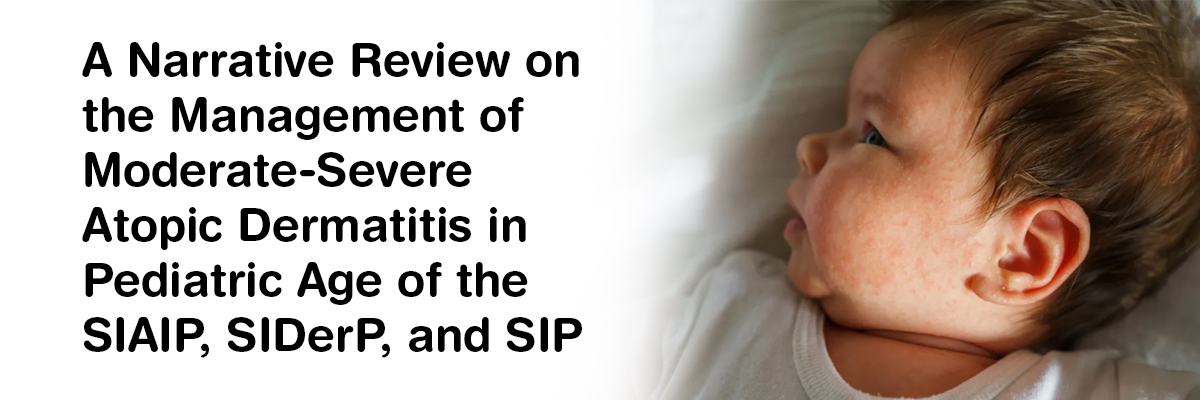
 IJCP Editorial Team
IJCP Editorial Team
A narrative review on the management of moderate-severe atopic dermatitis in pediatric age of the SIAIP, SIDerP, and SIP
AD is a complex disease demonstrating different clinical phenotypes, requiring an individualized and multidisciplinary approach. Only a few detailed guidelines direct the overall management of children and adolescents with moderate-severe atopic dermatitis. Thus, appropriate interaction between primary care pediatricians, pediatric allergists, and pediatric dermatologists is vital in establishing the best management strategy.
A recent manuscript involved the members of the Italian Society of Pediatric Allergology and Immunology (SIAIP), the Italian Society of Pediatric Dermatology (SIDerP), and the Italian Society of Pediatrics (SIP) with expertise in the management of moderate-severe atopic dermatitis to review the latest scientific evidence in the field. It defined a pathway to manage children and adolescents with moderate-severe atopic dermatitis appropriately.
The manuscript provided a flow chart for the possible multidisciplinary management of pediatric moderate-severe AD as:
- In General Practice, Primary Care pediatricians and General practitioners must manage mild AD. They should promote basic management strategies for AD (i.e., moisturizing, mild-moderate potency topical steroids, antibiotics) and refer moderate-severe AD patients to specialists.
- In Community or 1-2nd levels Hospitals, Pediatric Allergist and/or Dermatologist should manage mild to moderate AD (SCORAD <50) using I-II line therapy (e.g., Wet-wrap therapy; phototherapy). They can perform specific testing if necessary (e.g., skin prick test and/or serum-specific IgE testing, patch test, biopsy) and provide educational therapy. They should refer the patient to a University or 3rd level Hospital if the patients have severe AD (SCORAD >50) or are difficult to treat.
- In University or 3rd level Hospitals, Pediatric allergists and dermatologists should Re-evaluate the differential diagnosis and comorbidities, define the baseline severity (SCORAD and EASI) and perform further specific testing, if needed. They should initiate III line therapies for severe AD (e.g., add immunosuppressants and biologics) and manage comorbidities concurrently. Further, they can involve other specialist health care professionals (e.g., immunologists, psychologists, dieticians).
Galli E, Fortina AB, Ricci G, Maiello N, Neri I, Baldo E, Berti I, Bonamonte D, Capra L, Carboni E, Carello R, Caroppo F, Cavagni G, Chinellato I, Cipriani F, Comberiati P, Diociaiuti A, Di Lernia V, Duse M, Filippeschi C, Giannetti A, Giovannini M, Licari A, Marseglia GL, Pace M, Patrizi A, Pajno GB, Peroni D, Villani A, Eichenfield L. Narrative review on the management of moderate-severe atopic dermatitis in pediatric age of the Italian Society of Pediatric Allergology and Immunology (SIAIP), of the Italian Society of Pediatric Dermatology (SIDerP) and of the Italian Society of Pediatrics (SIP). Ital J Pediatr. 2022 Jun 14;48(1):95. doi: 10.1186/s13052-022-01278-7. PMID: 35701810; PMCID: PMC9195338.

IJCP Editorial Team
Comprising seasoned professionals and experts from the medical field, the IJCP editorial team is dedicated to delivering timely and accurate content and thriving to provide attention-grabbing information for the readers. What sets them apart are their diverse expertise, spanning academia, research, and clinical practice, and their dedication to upholding the highest standards of quality and integrity. With a wealth of experience and a commitment to excellence, the IJCP editorial team strives to provide valuable perspectives, the latest trends, and in-depth analyses across various medical domains, all in a way that keeps you interested and engaged.




















Please login to comment on this article